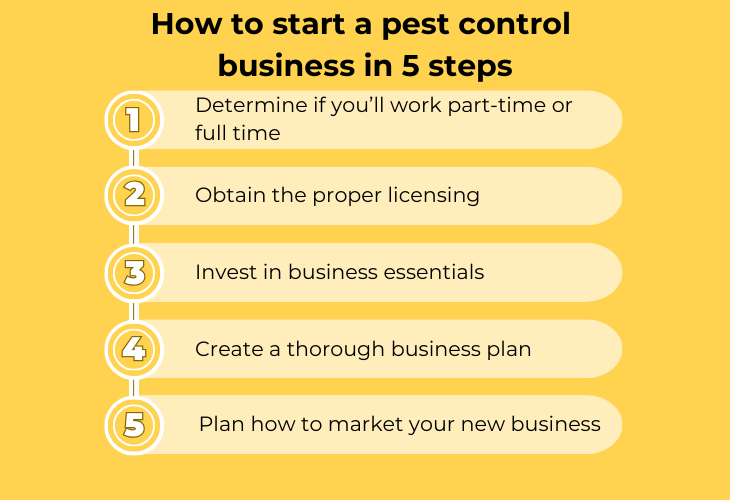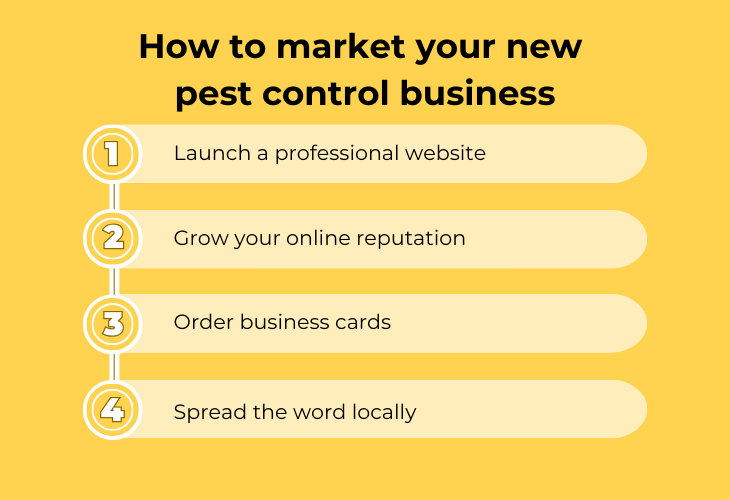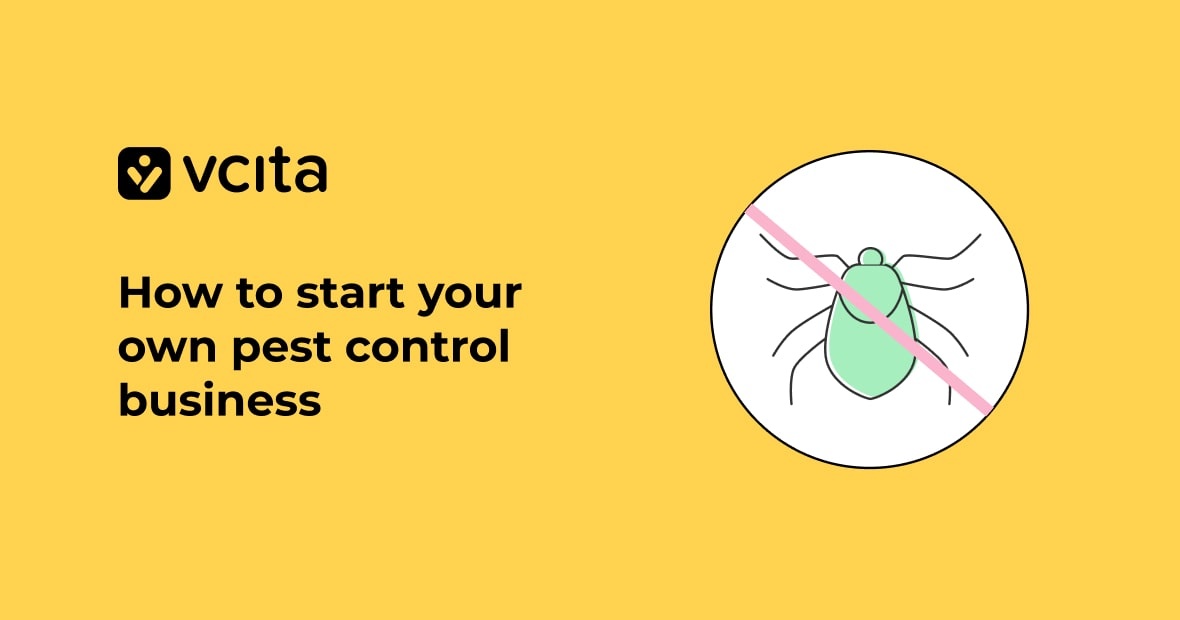Starting your own pest control business can be a rewarding experience if you take the right steps. From getting your business license to choosing your services and marketing tactics, there are many factors to consider when becoming a pest control business owner.
Whether you want to start part time or jump right in, you can start your pest control business with the right information and preparation.. Follow these steps to starting your own pest control company and join the ranks of small business owners in the pest control industry.
Types of pest control businesses
Before you start your own pest control business, you need to decide what types of services you want to offer. The most common options are:
- General pest control: This covers common bugs like cockroaches, ants, and rodents for residential and commercial customers. It’s a broad category, but also very competitive.
- Termite control: Specializing in termite inspections and treatments is a niche that can be very profitable, especially in warm areas. You’ll need to invest in termite pest control software to properly inspect properties.
- Mosquito control: Helping homeowners and businesses control mosquito populations and reduce the risk of diseases like West Nile virus. You’ll need to be licensed to apply pesticides.
- Bed bug control: Bed bug infestations are on the rise, so this specialty is in high demand. You’ll need to use heat and chemical treatments to fully eliminate bed bug problems.
Laying the groundwork for starting a pest control business

If you want to start your own pest control business, there are several steps you’ll need to take to get up and running. Once you’ve decided what services you want to offer, you need to determine if you want to operate full-time or part-time. As a new small business owner, starting part-time may be easier while you build your customer base.
Next, you’ll need to obtain the proper licenses and permits required in your state, and invest in business essentials like professional business cards, a logo, website, and business software to keep track of finances and invoices. Don’t forget insurance coverage for your business vehicles, equipment, and in case of liability issues.
Take time to create a thorough business plan, determine your costs, and explore financing options before launching your company. Research your target market, check out the competition, and look for gaps in the market that your business could fil..
Finally, plan how to market your new pest control business. Build a professional website highlighting your services, and create social media profiles to help get the word out. You can also join local business organizations, hand out flyers, send direct mailers, or advertise on community Facebook groups and Nextdoor.
Obtaining the necessary licenses and certifications
To operate a pest control business, you’ll need to obtain the proper licenses and certifications. The requirements vary in each state, so check with your local regulations, but you’ll probably need:
- Pest control business license: Issued by local governments to allow you to operate. You’ll need to pass an exam on pest control methods, safety standards, and regulations.
- Certified applicator license: Required for anyone applying pesticides. You must pass an exam to demonstrate your knowledge of proper handling and application. Some states require a commercial applicator license for business owners.
- General business licenses: Most states and cities require a general business license or permit to operate. The requirements and fees will depend on your location.
In this industry, staying up-to-date with regulations and safety standards is key, and it’s usually mandatory to pursue continuing education to maintain your licenses.
Purchasing equipment and supplies for your pest control business
Starting your own pest control business requires certain equipment and supplies. As a new business owner, you’ll need to purchase basics like business cards, accounting software, and a company vehicle. You’ll also need specific pest control equipment, depending on which types of pests you intend to target.
You’ll probably need to purchase these items to get your business started:
- Backpack sprayers, dusters, and bait stations for general pest control.
- Beekeeper suits and proper sprayers for handling bees or wasps.
- Supplies like pesticides, baits, and traps. Make sure the chemicals are approved for use in your state.
- Personal protective equipment (PPE) to safely handle and apply pesticides.
The startup costs for a pest control business typically range from $10,000 to $50,000, depending on the services you offer, so it’s best to start with the basics, then add more equipment as your business grows. Consider buying used equipment to save on startup costs.
Other business essentials include:
- Accounting software like Quickbooks to manage your finances.
- A van for meeting with clients and transporting equipment.
- Marketing materials such as a website, business cards, and social media profiles.
- Pest control software to schedule appointments, track service records, and manage pesticide applications according to state requirements.
Marketing your new pest control business

Now that you have your pest control business up and running, it’s time to spread the word! As a small business owner, marketing and promotion are key to building your customer base. Here are some effective ways to market your new pest control company.
Launch a professional website
Today, every business needs a website. Make sure that your site has all the details about your services, experience, credentials, and how to get in touch. Utilize search engine optimization (SEO) strategies to improve your visibility on Google and other search engines. This will help potential customers find your site when searching for “pest control” or “exterminator” in your area.
Grow your online reputation
Ask happy customers to write you reviews on sites like Google, Yelp, and Facebook. Positive reviews lend credibility and help convert website visitors into new customers. You should also create social media profiles on Facebook, Instagram, and LinkedIn to promote your services, share content, and engage with your target audience.
Order business cards
Design eye-catching business cards to hand out to potential customers. Include your company name, contact details, services offered, and website. Business cards are an easy way to spread brand awareness and stay top of mind.
Spread the word locally
Advertise in local publications like newspapers, magazines, and coupon mailers. You can also sponsor community events or youth sports teams to increase exposure. Don’t forget about traditional marketing methods like direct mail, flyers, and yard signs.
Managing the day-to-day operations of a pest control business
As a pest control business owner, you’ll need to handle many day-to-day tasks to keep your company running smoothly. Some common activities include:
Accounting
Using accounting software like QuickBooks or Xero can help you automate and simplify bookkeeping, allowing you to keep a close eye on the financial health of your business. Look for a solution that has sliding pricing so you can pay only for the features you need, and that integrates with your other business software.
Scheduling
Field service management software like vcita is designed to help pest control companies by efficiently scheduling technicians, sending appointment reminders, and allowing customers to book services independently. Implementing a system like vcita will save you a huge amount of time and hassle.
Inventory
Carefully monitoring your inventory of pesticides, equipment, and other supplies is important. Software suites can track stock levels and automatically create purchase orders when supplies run low so you always have what you need on hand for each job.
Invoicing
You won’t get paid unless you send invoices, but managing the process can take a lot of time. Use invoicing and billing software like vcita to automate the process of creating, sending, and following up on invoices, so that customers receive professional and easy-to-read invoices on time. You can even invite them to pay online through the invoice, to help you get paid faster.
Marketing
Marketing is vital to attract new customers. Use social media to build your brand on websites like Facebook, Twitter, and Yelp, and invest in search engine optimization to help potential customers find your business. You could also start a blog to establish yourself as an expert in the industry, or run pay-per-click campaigns to increase traffic.
Compliance
Familiarize yourself with the licensing and certification requirements in your state to make sure you comply with requirements. Most states mandate special training and certification for pesticide applicators. Stay up to date with safety standards and regulations in the pest control industry. Joining industry organizations is a good way to stay informed.
Juggling all these responsibilities may seem daunting, especially when you’re just getting started. Consider hiring office staff or an accountant to help take some of the workload off your plate so you can focus on growing your business. With time and experience, managing the day-to-day operations of your pest control company will become second nature.
Build a successful pest control business
Though starting any small business requires an investment of time and money, the pest control industry offers ample opportunities for those willing to put in the effort. With hard work and persistence, you can build a successful small business helping homeowners and businesses eliminate pest problems. Follow the proper steps, obtain the necessary licenses, invest in quality equipment and marketing, and start promoting your business, and you’ll be on your way to becoming a trusted pest control expert in your community.




























